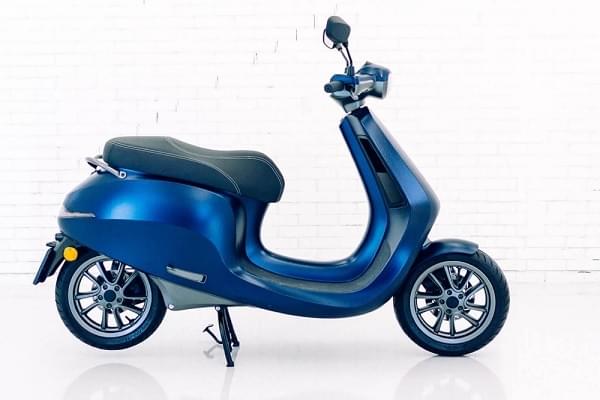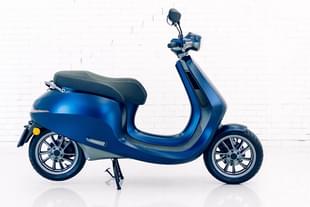News Headlines
Ola To Set Up World’s Largest Scooter Manufacturing Plant in Tamil Nadu At An Investment Of ₹2,400 crore
Swarajya Staff
Dec 14, 2020, 03:50 PM | Updated 03:49 PM IST
Save & read from anywhere!
Bookmark stories for easy access on any device or the Swarajya app.


Ola Electric today announced that it has signed a Memorandum of Understanding (MoU) with the government in Tamil Nadu to set up, what it calls, the biggest electric scooter manufacturing plant in the world.
The company will invest ₹2,400 crore ($320 million) to establish the production facility. The company said that new facility will create 10,000 jobs. The world’s largest scooter manufacturing facility, which will initially have an annual capacity of 2 million units.
"In line with Prime Minister Narendra Modi’s vision, Ola’s factory is an important step in making an AtmaNirbhar Bharat. It will catalyze reduction of India’s import dependence in a key future sector like electric vehicles, boost local manufacturing, create jobs as well as improve the technical expertise in the country." the company statement said.
“This will be one of the most advanced manufacturing facilities in the world. This factory will showcase India’s skill and talent to produce world class products that will cater to global markets,” said Bhavish Aggarwal, Chairman and Group CEO, Ola in a statement.
"This is a significant milestone for Ola and a proud moment for our country as we rapidly progress towards realizing our vision of moving the world to sustainable mobility solutions across shared and owned mobility. This will be one of the most advanced manufacturing facilities in the world," Bhavish Aggarwal added.
Excited to announce the worldâs largest scooter factory in Tamil Nadu. An investment of 2,400cr, it'll create 10,000 jobs & showcase India's capability to manufacture global products. I thank honorable @CMOTamilNadu for his vision & support. https://t.co/LELVrxGXln @OlaElectric pic.twitter.com/4pvfB23MlO
— Bhavish Aggarwal (@bhash) December 14, 2020
Ola expects the plant to emerge as a major hub for the manufacturing of EVs. Units manufactured here will also be shipped to European, Asian and Latin American markets.
The factory will produce Ola’s upcoming range of two wheeler products starting with Ola’s electric scooter.
Ola plans to roll out its scooters in India, Australia, the Netherlands, New Zealand, among other places, by the first quarter of 2021.
Earlier this year, Ola announced that it has acquired Etergo, a Dutch firm that has built a scooter that uses swappable, high energy battery that delivers a range of up to 240 km. The acquisition was seen as part of company’s strategy to locally produce and launch its own line of two wheelers as soon as this year.
Ola is also in talks with Karnataka to set up the plant within the state, company officials said.
In Sep 19, Tamil Nadu Chief Minister Edappadi K Palaniswami unveiled an ambitious Electric Vehicle Policy that was aimed at catapulting the state as the hub of electric vehicles (EVs) and component manufacturing units including battery and charging infrastructure.
Through the policy, Tamil Nadu, currently a major automotive manufacturing powerhouse, aimed to build a comprehensive EV ecosystem for which it hopes to attract a cumulative investment of Rs 50,000 crore. Around 150,000 new jobs are expected to be created in the new ecosystem.
Under the policy, besides waiver on registration charges/fees (as per Government of India's notification), the state government introduced 100 per cent motor vehicle tax exemption for all electric vehicles including two wheelers, cars, auto rickshaws, buses and light goods carriers – till 31 December 2022.
There will be no permit requirement for the three-wheeler goods, e-carriers as well as electric light goods carriers.
The state also unveiled to create a robust infrastructure for electric vehicles including adequate power supply and network of charging points with favourable power tariff. TANGEDCO (Tamil Nadu Generation and Distribution Corporation) will set up charging infrastructure on its own or through public private partnership models.
The state plans to set up one charging station every 25 km on both sides of NHAI and State Highways.
The State government also offereed incubation services in the form of office space, common facilities and mentoring support to encourage start-ups in the EV sector.
Under the EV policy, the state promised support for existing automobile manufacturers to adapt to the EV manufacturing system including a one-time re-skilling allowance for the existing production line employees.
The policy promised to create a pool of skilled workforce for the EV industry through the technical institutions available in the state and create new jobs.
The by Tamil Nadu is in line with the Centre’s extensive push for EV adoption. In her 2019 budget speech Finance Minister Nirmala Sitharaman had unveiled benefits for EV buyers and announced favourable regulatory environment for the industry.
Sitharaman had announced a rebate of up to Rs 1.5 lakh for the buyers on interest paid on loans to purchase the vehicles, with benefit of up to Rs 2.5 lakh over the entire loan period. To lower the cost of manufacturing for the industry, she announced customs duty exemption on lithium–ion cells.
The government has also implemented the FAME-II scheme via which it seeks to incentivise the adoption of electric buses, three and four-wheelers, and those with sizeable lithium-ion battery.





